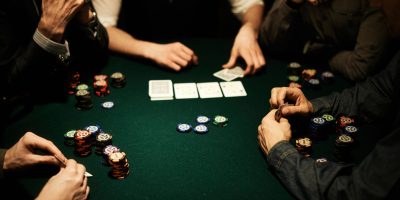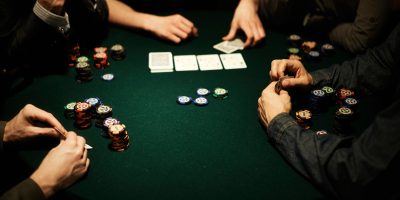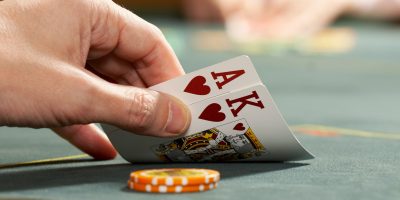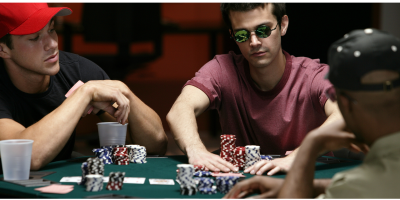Donk Bets
Learn what poker donk betting is, and how to use the right donk betting strategies when playing out of position. Also understand how to play against a donker.
Donk-betting is a type of poker bet that gets a bad rap, and for good reasons. For most players, it's better for your win-rate to never donk at all than to take on the risk and effort to do it properly.
But what is a donk bet, and should you ever do it?
What is a Donk Bet
A donk bet is when the out-of-position player (who acts first) bets out when they weren't the aggressor on the previous street.
This goes against the flow of the action and denies the previous street's aggressor the opportunity to make a continuation bet.
If there was no aggressor on the previous street then it's not a donk bet. It's just taking the betting lead.
For example, if it's a limped pot there is no pre-flop raiser and so no aggressor to donk into on the flop. Or if the preflop raiser checks behind on the flop then it's not a donk bet if you bet out on the turn. Again, there is no aggressor from the previous street.
And if you are in-position, you cannot donk bet - because you act last.
Donk betting is generally seen as a bad idea, hence the name - which comes from the derogatory poker term of "donk" or "donkey" for a bad player that does stupid things.
In the hierarchy of poker players, the donk is even lower than the fish! But as we shall see, there are times where it is theoretically correct to donk-bet.
What's Wrong With Donking Anyway?
Donking isn't bad because it's a breach of protocol, or because bad players love to do it. In fact, donk betting can be the theoretically correct play in certain scenarios.
In practice though, not donk-betting is almost always the better strategy.
If you check to the previous street's aggressor, you get to see what they will do, and information is king in poker.
If they continuation bet, you get to close the action on that street - you can fold and save yourself money, you can check/raise and build the pot, or you can call and see the next card/showdown.
And if they don't c-bet then you have learned something about their hand.
If you donk into them, then you have immediately cost yourself the price of that bet. If they raise you, you are in an awkward situation. If they call, you get no information about their hand - they could be trapping you with a monster hand! And if they fold, they've saved themselves a c-bet that you could have won by check/raising them.
Donking allows your opponent to fold out their bluffs and continue with their strong hands. You want them to bluff and continue with weak hands!
Most boards (community cards) will favor the aggressor's range of possible holdings and this means it's silly to bet on them when you are at a disadvantage.
Donk betting just complicates everything. If you check 100% of your hands, then your opponent has no way of reading your hand before they decide to make a C-bet.
But if you donk with some hands and check with others then you are splitting your range of hands into two, and that gives your opponent something to work with. Donk betting makes your game easier to read, and that makes you easier to exploit.
The stronger your donking range, the weaker your checking range will be. And the weaker your donking range, the more you are building up a pot when you are behind and out of position.
Donk Bets Aren't Always Bad - But They Are Hard to Do Right
Despite all these reasons and despite the name, donk bets aren't always terrible. It's possible to create a perfectly balanced donking/checking range and then donk exploitatively.
But in practice, it's really difficult to incorporate donk bets into your overall strategy without making your game unbalanced and exploitable.
The mistakes you make donking will be often more expensive than any potential gain from donking perfectly.
It's extremely easy to lie to yourself that you are donk-betting in a balanced fashion - and extremely difficult to actually do it.
Importance of Position
A donk bet can only be made by the out-of-position player - you can never donk when in position. This is because the out-of-position player acts first and the in-position player acts last.
If there is more than one player involved, then all but the player to act last are out-of-position. Therefore, any of them betting out when they were not the previous street's aggressor is considered a donk bet.
If you are in-position and the previous street's aggressor checks to you then betting is not a donk bet because you are not going against the flow of action. The aggressor had the opportunity to C-bet but turned it down.
If you're out-of-position and don't have the betting initiative, then you are at a serious disadvantage. Donk betting is one way to seize control of the hand and put pressure on the in-position player. It's just that check-raising is usually the more profitable way of doing that.
Flop, Turn, River
The later the betting street, the more acceptable it is to donk bet. Flop donking is almost always a bad idea, but there are a few situations where it's right to donk on the turn, and even more for donking the river.
It's always dependent on the board texture and your reads on your opponent though.
With the turn, it is theoretically correct to donk when the turn card makes the board strongly favor your range.
With the river, if you complete your draw and are sure your opponent will check behind then it's worth firing out a carefully sized donk bet to attempt to extract some value.
Likewise, you can bluff donk when the board completes a draw on the river, in order to scare your opponent into thinking you've made your hand.
Donk Bet Size
There are only two good reasons to make any sort of bet, including donk bets:
- for value (that is make them call with a worse hand), or
- to deny your opponent equity (that is make them fold a better hand or a drawing hand that could improve to beat you)
Your bet sizing should always be made with one of these two reasons in mind - even when you are donk betting.
If you are playing exploitative poker then value bets should be the biggest size that your opponent will call with worse - and your bluffs should be as small as you can get away with to make your opponent fold.
If you are playing balanced Game Theory Optimal poker, then your bet size needs to be based on your bluff-to-value ratio. For example, if you bet pot, then your opponent is getting 2-to-1 odds to call and will break even if he is right to call 33% of the time (because 2-to-1 = 33%). If you are bluffing less than 33% of the time you will profit.
Examples of Donk Betting
Let's take a look at a couple of examples of donk betting in action.
Fictional Example
- Villain on the Button with and opens to 3bb
- Hero calls in the big blind with
- Flop comes (6.5bb pot)
- Hero acts first and chooses to donk out 50% pot (3.25bb)
- Villain folds
- Hero wins 6.5bb
Now let's look at it again, when Hero chooses not to donk bet
- Villain on the Button with and opens to 3bb
- Hero calls in the big blind with
- Flop comes (6.5bb pot)
- Hero acts first and chooses to procedurally check
- Villain C-bets 50% pot (3.25bb)
- Hero raises to 10bb
- Villain folds
- Hero wins 9.75bb
In this very simple example, we can see that donking wins us 33% less money than check/raising.
But what if our opponent doesn't continuation bet?
- Villain on the Button with and opens to 3bb
- Hero calls in the big blind with
- Flop comes (6.5bb pot)
- Hero acts first and chooses to procedurally check
- Villain checks
- Turn comes (6.5bb pot)
- Hero bets half pot (3.25bb)
- Villain folds
- Hero wins 6.5bb
So you win exactly the same amount as if you donked - in other words, donk betting has no advantage here whatsoever.
If your opponent does call your donk, you can be fairly certain they would have been C-betting anyway.
And if your opponent raises you then all of a sudden you have to ask yourself whether your bottom set is as good as you thought. It is in this example - but we can see their cards. It's an awkward situation to be in. And often players do it with top pair or worse!
Video Example
Everyone's favorite Lithuanian-Australian maniac Tony G pulls off a cheeky flop donk bet here against the legendary Dan Cates, aka Jungleman.
Jungleman opens from the Hijack with pocket Aces, and Tony G calls in the Big Blind with .
You can clearly see the confusion on Jungleman's face as Tony G donks the flop of .
The combination of Tony G's wild table image and good fortune that his opponent is holding Aces (an incredibly difficult hand to fold) - means that Jungleman stays in the hand.
But be warned, Tony G does not care about being balanced at all - and his loose-aggressive style of play is very difficult to emulate successfully!
When To Donk Bet In Poker
The simplest donk betting strategy is never to donk bet at all. That said, there are some situations when it's worth at least considering whether you should donk:
- Exploitative donking
- Range-advantage donking
- Multiway pots
- River donking
Exploitative Donking
The old saying "play the man and not the cards" is true in most poker games, especially at lower stakes.
The fact is most players hate being donked into. Often, they either just fold or they get offended and either call or raise out of spite. You can use this to your advantage.
If you think your opponent over-folds to donk bets then you should donk bluff in order to steal the pot. If you think your opponent over-raises donks then it's worth donking with value hands.
And if your opponent is a passive calling station who is unlikely to continuation bet but will call with almost anything then it makes sense to value donk to get money into the pot.
Repeatedly donking an opponent is a good way to put on them on tilt, too.
Just remember, there's nothing easier than lying to yourself that you're exploiting your opponents when really it's you that's making their game easy to exploit.
Range-Advantage Donking
We've said a donk is a bet made by an out-of-position player who doesn't have the betting initiative.
But from a theoretical point of view, the idea of "betting initiative" isn't real. What is important is . This means one player's possible range of holdings is stronger than their opponent's possible range of holdings, taking into account the board texture.
You can only be in a position to donk bet when you are out-of-position as the pre-flop caller - so you are either in the blinds or you've called a 3-bet.
In both these situations, calling "caps" your range. You are telling your opponent that you don't hold certain strong card combinations because if you did you would have re-raised instead. And you don't hold complete trash as you wouldn't have called.
Most board textures favor the range of the aggressor rather than the caller. But some boards do actually favor the caller - for example, low connected boards are more likely to hit the sort of cards the caller has than the raiser.
This means the aggressor is more likely to check behind because they don't want to build the pot when they are at a disadvantage, and they definitely don't want to face a raise. They want to see a free card/showdown.
In this situation, it can be theoretically correct to donk, because you want to build the pot when you have the advantage and you don't want to give away a free card.
It's still not really worth doing on the flop. The best situation to do it is when the turn card hits your possible range much better than your opponents, as it almost always means they will check behind (at least if they pay attention to such things!)
Bear in mind that this strategy will only work if you balance your value donks and bluff donks carefully, along with your checking and check-call range. Otherwise, you will be too easy to read and you will end up losing more money than if you never donk at all.
This is a lot of effort - and risk - for not a lot of reward. So be warned!
Multiway Pots
Value donking is nowhere near as bad in a multi-way pot as it is heads-up. This is because you are much more likely to be called or raised as there is more chance someone has made a hand.
It is also much worse to give away a free card in a multiway pot because it is much more likely to improve at least one of your opponents' hands.
The previous street's aggressor is also much less likely to C-bet if they have nothing because it's less likely to succeed against more people.
This means it makes sense to donk when you have a very strong hand but the next card could change all that. We are talking two pairs or better really, depending on the .
You are hoping to get raised and then you can get it all in when you are ahead, rather than allowing another card to come that either kills the action or demotes your hand to second best.
Bluff donking is even worse multiway though - you are much more likely to be called!
River Donking
This situation is so common that some people don't even consider it donking. You make what you think is the best hand by the river and you do not want to risk your opponent checking behind for a free showdown. So you fire out a value donk bet. If you get raised even better!
Or to put it another way, don't value bet the river with a hand that can't stand a raise. That is just lighting money on fire.
River donking is also a good bluffing opportunity. For example, if the river makes it three or four cards to the flush, then you can donk to represent you've made the nuts. Of course, if your opponent has actually made the nuts then they are going to raise you up.
That said, it takes real cojones to raise a river bet on a board like that so you can normally fold safe in the knowledge they aren't bluffing - and you've only spent what you have spent anyway on calling their river bet had you checked to them.
Of course, there are times where a player is so clueless or aggro that they are raising with some mediocre holding. But you need not worry about that. You'll take their money eventually.

When Should You Not Use Donk Bets
Despite all the above scenarios - and at the risk of sounding like a broken record - it's so much better not to donk at all than to donk incorrectly.
Even if you do want to incorporate donking into your strategy, bear in mind you should still do it extremely rarely - solvers only donk about 2% of the time, for example.
So this means you should not use donk bets between 98-100% of the time!
There are some particularly terrible spots to do it though, which happen to be the most common types of donk used by weak players:
- The donk probe
- Donking flop for value
- Donking to price your own draws
- Donking as a bluff that makes no sense
Don't Probe Donk
The classic donk bet is when a weak player bets out a small amount "to see where they are at" in the hand. For example, they bet 1bb into a pot of 10bb. This would be incorrect even if they weren't donking because they are giving their opponents very attractive pot odds to call with almost any two cards. Probe bets can be useful but there is an Art to it.
As we mentioned earlier, there are only two good reasons to make a bet - and "seeing where you are at" is not one of them.
In any case, making a tiny little bet isn't really going to get you any information! Most good players will ignore it and treat it like you'd checked to them - calling if they would have checked behind, and raising to whatever their C-bet would have been.
Don't Donk the Flop with Marginal Hands
Another classic donk bet is when the OOP pre-flop caller gets all excited when they make a good (but not great) hand on the flop, usually some sort of pair. They bet out for value, scared that their opponent might check behind and they'll miss out on building the pot (although sometimes they aren't even thinking that far ahead, they just see they've made a hand and so they bet).
This is a bad idea because it's easily exploitable. It severely weakens your checking range because your opponents know you don't have anything when you check as you would have donked.
It also doesn't achieve what it sets out to do - it allows them to fold all their bluffs, and you just missed out on the value of a C-bet. You could have just let them C-bet and raised them instead!
Check-calling gets the same amount of money in the pot as a donk bet, and you also have the option to check-raise and put your opponent in a difficult spot. Profit in poker comes from your opponent's mistakes, and putting them in difficult spots is the best way to force mistakes. Don't make things easy for them by donking!
Yes, your opponent could check behind and you might miss out on one street of value. But remember that you aren't going to get three streets of value against most hands that you beat. You are going to get two at most unless your opponent is a real calling station.
Finally, getting raised when you have a good-but-not-great hand is pretty horrible. Suddenly you realize your opponent could have a set, two pairs or an overpair - and you've got to get through another two streets of betting out-of-position to reach a showdown.
Really all you are doing when you value donk the flop is bloating the pot when you are out-of-position. That is rarely a good idea unless you are sure you'll have the best hand by the river!
Don't Donk to Price Your Own Draws
When you have a good draw, it's annoying to have to fold to a big C-bet because you aren't getting the right pot odds to continue. So it can be tempting to fire out a bet yourself that's the right size, hoping that your opponent will just call it.
You should never play poker in hope because that means you're thinking about the short-term and not the long-term. You might not get to chase this draw - but so what? Play the long game. There's always another hand. And maybe you won't be out-of-position next time, and so you'll actually be able to get properly paid off if you do hit your draw.
And if your opponent is paying attention, they are going to look at the board and then at the size of your bet, and know exactly what you are up to. They will raise your donk bet and suddenly your goal of seeing the next card cheaply just turned into totally the opposite situation.
Don't Donk Bluff Unless it Makes Sense
There's nothing weirder than getting donked into on a board that hits your range much better than theirs, only to find out at showdown that they had nothing.
Perhaps they are trying to exploit you - who knows!
But if you are going to donk bluff to try and exploit your opponents, make sure that you are telling a realistic story with your bluff.
For example, if the flop comes AA2 it makes absolutely zero sense for you to donk bluff, unless you hate money or you are playing against the world's most scared player. The pre-flop raiser just has so many more Aces in their range of possible hands than you do.
And not only that, if you have just made trips, then why would you be donking when you holding an Ace makes it so much less likely for your opponent to hold one too? There's only one left in the pack, and you've made the near nuts, so surely you would at least be check-raising if not check-calling?
Like any bluff, exploitative donk bluffs need to make sense.
How To Play Against a Donk Bet
Donk bets are annoying to deal with, there's no getting around it.
Here are a few tips to bear in mind when you find yourself facing a donker at a poker table.
Ignore the Min Donk
The archetypical tiny-sized donk-bet is the easiest to deal with. Just ignore it and act like it never happened. If you were going to check behind, then call. If you were going to C-bet then raise it up to whatever % of the pot you were going to C-bet.
Big Donk Bets Often Mean Scared Money
Usually, a big donk bet (pot-sized is the most common) on a wet board means they have made a hand and they are terrified of draws. They want to take the pot down right there and then.
It's up to you how you deal with these. But if you don't have the right pot odds to chase a draw then you need the right implied odds - and scaredy-cat nits rarely pay people off when the board completes an obvious draw.
Beware Multiway Donks
As mentioned above in the "When to Donk" section, multi-way donks are a much better idea than heads-up donks. Even the worst player intuitively understands that it's just so much more likely at least one of your opponents has some sort of hand than when you are heads-up against one opponent.
This means you should give multiway donk-bets credit. It's also no fun calling a donk bet only to get squeezed out of the hand when the in-position player raises!
Pay Attention to Their Stats and Make Notes
If you use a hand tracking HUD like PokerTracker4 or Hold'Em Manager, then it's worth looking at a donker's stats - in particular, their donk bet percentage. If they are donking 10% of the time or less then they are only donking when they make the nuts. If you have nothing and no way to improve, just fold and save yourself the price of a C-bet.
If they have a high donk bet stat of more than 50% then you know they are donking with air and draws as well as made hands. Now you can start raising them up.
If you don't use a HUD - and even if you do - nothing beats taking notes on players. Pay attention to what they are donking with and make a note.
Trap Them
One of the best feelings in poker is when you smash the flop and make a monster - only for your opponent to donk into you. You could raise them - or you could call and hope they try to barrel you on the turn and river. Then you raise up their river bet and watch them squirm!
However, make sure you do definitely have a monster and not a good hand that could turn into the second-best hand. Slow-playing a full house is one thing - but slow-playing top pair is just silly.
Donk Bets: FAQ
Answers to the most common questions about donk betting in poker.
Should you donk bet in micro stakes?
As a general rule, it's better not to donk bet at the micro stakes. You want to keep things as simple as possible and play solid ABC poker. Balanced donking strategies are possible, but they just aren't necessary at the micros where you should avoid "Fancy Play Syndrome" at all costs.
However, if you have a read on your opponent - or some reliable HUD stats - then you can exploitatively donk to your hearts content with very little risk of anyone actually catching on and using it against you.
What is the purpose of a poker donk bet?
Bad players will donk bet for four main reasons - for value, for protection, as a bluff, or to price in their own draws. Good players will donk for two reasons - when it's theoretically correct to do so as part of a balanced strategy - or to exploit their opponents' specific weaknesses.
Should you re-raise a donk bet with a premium hand?
When you get donked into, you need to decide why your opponent is doing it. If they are donking a lot then they are unlikely to have much and you can either raise it up to take down the pot - or call to trap them. If they are a nit who rarely donks then seriously consider whether you want to build the pot for them and reopen the action instead of calling to see the next card or showdown.
If the donk bet is very small though, just act like it never happened. Call it if you were going to check behind and raise it up to whatever % of the pot you were going to C-bet to.
How big should a donk bet be?
A donk bet is like any other bet in poker and so should be sized in the same way. You should only bet in poker for value (to get called by worse) or to deny your opponent their equity (by making them fold better hands or strong draws). Size your bet as big as it needs to be to make them call with worse, and as small as it needs to be to make them fold.
What ranges should you donk with?
It is possible to construct a carefully balanced donk betting range. But it is also pretty complicated and difficult to pull off. The stronger your donking range, the weaker your checking range will be - and vice versa. It makes more sense to keep it simple by never donking. If you absolutely must donk, do it with your entire range in certain situations - e.g. turn or river cards that significantly change the board texture in your favor. At least that way you won't be unbalanced and exploitable.
In poker, donk betting is something to avoid - even though sometimes it's the correct play. It's extremely tough to incorporate into your game without making your play unbalanced and exploitable. The potential profit from donking correctly is outweighed by the effort involved and the risk of much bigger losses if you mess it up.





